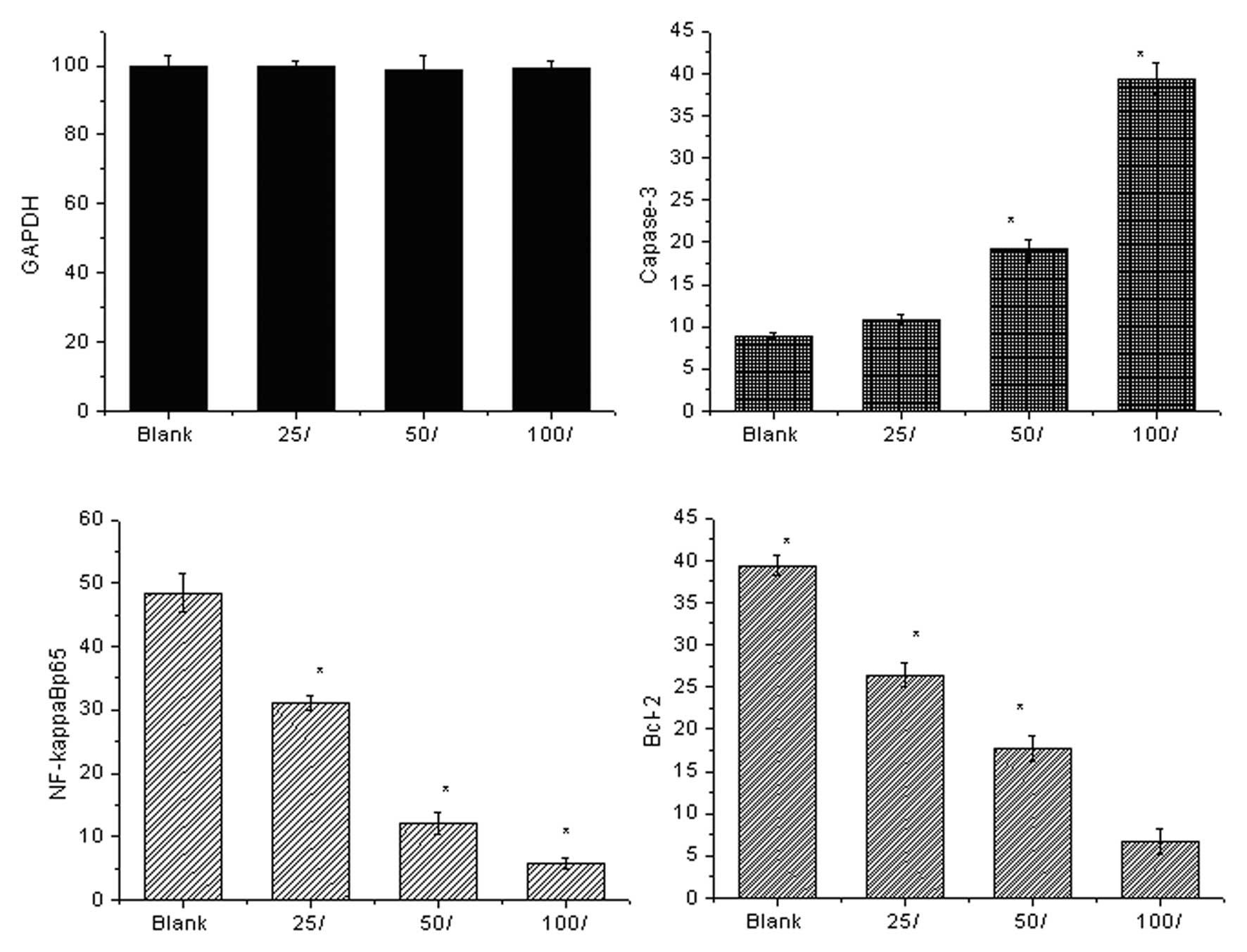|
1.
|
Kontogiorgis C, Detsi A and
Hadjipavlou-Litina D: Coumarin-based drugs: a patent review (2008 -
present). Expert Opin Ther Pat. 22:437–454. 2012. View Article : Google Scholar : PubMed/NCBI
|
|
2.
|
Anand P, Singh B and Singh N: A review on
coumarins as acetylcholinesterase inhibitors for Alzheimer’s
disease. Bioorg Med Chem. 20:1175–1180. 2012.
|
|
3.
|
Chakraborty AK, Funasaka Y, Pawelek JM,
Nagahama M, Ito A and Ichihashi M: Enhanced expression of
melanocortin-1 receptor (MC1-R) in normal human keratinocytes
during differentiation: evidence for increased expression of POMC
peptides near suprabasal layer of epidermis. J Invest Dermatol.
112:853–860. 1999. View Article : Google Scholar
|
|
4.
|
Yang EB, Zhao YN, Zhang K and Mack P:
Daphnetin, one of coumarin derivatives, is a protein kinase
inhibitor. Biochem Biophys Res Commun. 260:682–685. 1999.
View Article : Google Scholar : PubMed/NCBI
|
|
5.
|
Finn GJ, Creaven BS and Egan DA: Daphnetin
induced differentiation of human renal carcinoma cells and its
mediation by p38 mitogen-activated protein kinase. Biochem
Pharmacol. 67:1779–1788. 2004. View Article : Google Scholar : PubMed/NCBI
|
|
6.
|
Finn GJ, Kenealy E, Creaven BS and Egan
DA: In vitro cytotoxic potential and mechanism of action of
selected coumarins using human renal cell lines. Cancer Lett.
183:61–68. 2002. View Article : Google Scholar : PubMed/NCBI
|
|
7.
|
Riveiro ME, Moglioni A, Vazquez R, Gomez
N, Facorro G, Piehl L, de Celis ER, Shayo C and Davio C: Structural
insights into hydroxycoumarin-induced apoptosis in U-937 cells.
Bioorg Med Chem. 16:2665–2675. 2008. View Article : Google Scholar : PubMed/NCBI
|
|
8.
|
Elinos-Báez CM, León F and Santos E:
Effects of coumarin and 7OH-coumarin on bcl-2 and Bax expression in
two human lung cancer cell lines in vitro. Cell Biol Int.
29:703–708. 2005.PubMed/NCBI
|
|
9.
|
Chuang JY, Huang YF, Lu HF, Ho HC, Yang
JS, Li TM, Chang NW and Chung JG: Coumarin induces cell cycle
arrest and apoptosis in human cervical cancer HeLa cells through a
mitochondria- and caspase-3 dependent mechanism and NF-kappaB
down-regulation. In Vivo. 21:1003–1009. 2007.PubMed/NCBI
|
|
10.
|
Saidu NE, Valente S, Bana E, Kirsch G,
Bagrel D and Montenarh M: Coumarin polysulfides inhibit cell growth
and induce apoptosis in HCT116 colon cancer cells. Bioorg Med Chem.
20:1584–1593. 2012. View Article : Google Scholar : PubMed/NCBI
|
|
11.
|
Bronikowska J, Szliszka E, Jaworska D,
Czuba ZP and Krol W: The coumarin psoralidin enhances anticancer
effect of tumor necrosis factor-related apoptosis-inducing ligand
(TRAIL). Molecules. 17:6449–6464. 2012. View Article : Google Scholar
|
|
12.
|
Rasul A, Khan M, Yu B, Ma T and Yang H:
Xanthoxyletin, a coumarin induces S phase arrest and apoptosis in
human gastric adenocarcinoma SGC-7901 cells. Asian Pac J Cancer
Prev. 12:1219–1223. 2011.PubMed/NCBI
|
|
13.
|
Bhattacharyya SS, Paul S, Dutta S,
Boujedaini N and Khuda-Bukhsh AR: Anti-oncogenic potentials of a
plant coumarin (7-hydroxy-6-methoxy coumarin) against
7,12-dimethylbenz [a] anthracene-induced skin papilloma in mice:
the possible role of several key signal proteins. Zhong Xi Yi Jie
He Xue Bao. 8:645–654. 2010.PubMed/NCBI
|
|
14.
|
Singh RK, Lange TS, Kim KK and Brard L: A
coumarin derivative (RKS262) inhibits cell-cycle progression,
causes pro-apoptotic signaling and cytotoxicity in ovarian cancer
cells. Invest New Drugs. 29:63–72. 2011. View Article : Google Scholar : PubMed/NCBI
|
|
15.
|
Bhattacharyya SS, Paul S, Mandal SK,
Banerjee A, Boujedaini N and Khuda-Bukhsh AR: A synthetic coumarin
(4-methyl-7 hydroxy coumarin) has anti-cancer potentials against
DMBA-induced skin cancer in mice. Eur J Pharmacol. 614:128–136.
2009. View Article : Google Scholar : PubMed/NCBI
|
|
16.
|
Thati B, Noble A, Creaven BS, Walsh M,
McCann M, Devereux M, Kavanagh K and Egan DA: Role of cell cycle
events and apoptosis in mediating the anti-cancer activity of a
silver(I) complex of 4-hydroxy-3-nitro-coumarin-bis(phenanthroline)
in human malignant cancer cells. Eur J Pharmacol. 602:203–214.
2009. View Article : Google Scholar
|
|
17.
|
Hsu YL, Kuo PL and Lin CC: Proliferative
inhibition, cell-cycle dysregulation, and induction of apoptosis by
7,8-dihydroxycoumarin in human non-small cell lung cancer A549
cells. Life Sci. 75:2303–2316. 2004. View Article : Google Scholar : PubMed/NCBI
|
|
18.
|
Li Y, Xing D, Chen Q and Chen WR:
Enhancement of chemotherapeutic agent-induced apoptosis by
inhibition of NF-kappaB using 7,8-dihydroxycoumarin. Int J Cancer.
127:462–473. 2010.PubMed/NCBI
|
|
19.
|
Jang BC: The fruit juice of Morinda
citrifolia (noni) down-regulates HIF-1α protein expression
through inhibition of PKB, ERK-1/2, JNK-1 and S6 in
manganese-stimulated A549 human lung cancer cells. Int J Mol Med.
29:499–504. 2012.
|
|
20.
|
Barkett M and Gilmore TD: Control of
apoptosis by Rel/NF-κB transcription factors. Oncogene.
18:6910–6924. 1999.
|
|
21.
|
Tang G, Yang J, Minemoto Y and Lin A:
Blocking caspase-3 mediated proteolysis of IKKβ suppresses
TNF-α-induced apoptosis. Mol Cell. 8:1005–1016. 2001.PubMed/NCBI
|
|
22.
|
Ravi R, Mookerjee B, van Hensbergen Y,
Bedi GC, Giordano A, El-Deiry WS, Fuchs EJ and Bedi A: p53-mediated
repression of nuclear factor-kappaB RelA via the transcriptional
integrator p300. Cancer Res. 58:4531–4536. 1998.PubMed/NCBI
|


















